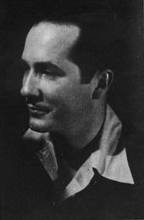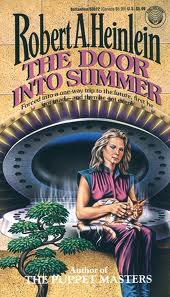The Door into Summer, by Robert Heinlein, is the author’s last adult novel written before his arguably three most famous works: Starship Troopers, Stranger in a Strange Land, and The Moon is a Harsh Mistress. The book benefits from the strong points that every Heinlein novel displays, but in other ways it almost feels like the author was holding back. Like Alfred Hitchcock, Heinlein had some great works mixed in with a lot of decent ones, and the present novel fits squarely into the latter category. In researching it, I came across a quote by John W. Campbell that sums up for me how I feel about certain Heinlein novels, The Door into Summer included: “Bob can write a better story, with one hand tied behind him, than most people in the field can do with both hands. But Jesus, I wish that son of a gun would take that other hand out of his pocket.”
The narrator, Dan Davis, is a gifted engineer who cannot see eye to eye with his business partner and best friend, Miles Gentry. Miles and Dan’s fiancée, Belle, conspire to steal Dan’s company from him and then send him into hibernation for thirty years. He wakes up in the year 2000, destitute, but begins working to build himself back up and maybe get some revenge. Along the way, as Dan investigates what has happened since he was put into the “Long Sleep,” strange clues begin turning up, indicating that there is more going on than he may realize.
It is a short book, and therein lie many of its problems. I would guess it weighs in at about 60,000 words, scarcely more than half a typical novel. And while some stories, like Starship Troopers, are smaller and do not require a full 100k, The Door into Summer could easily have accommodated a hundred more pages or so. The plot is full enough, and there are enough characters, but as it is, it feels as if Heinlein skimped a bit.
There are characters who come to be important to Davis, but whom we never really get to know well because there just is not enough time. More scenes with more character interactions might have done the trick, or perhaps the scenes already there needed fleshing out. The more invested we are in the characters, and the more immersed in this world, the more engaging are the plot points.
Sixty thousand words, or whatever the total was, simply do not permit the author to bring everything he has to this particular story. There are plenty of things that work in the novel, but it all feels very rushed and very brief for a story like this. It feels like there should have been more. I am moved to cite Bastiat’s lesson on the seen and the unseen in economics. What exactly should have been included I cannot say, but its absence diminishes the work. How might it have turned out if Heinlein had, instead of the alleged thirteen, spent twenty six days fashioning the tale?
Imagine a cook conceiving a meal, but then finding himself without many of the ingredients he planned for. He is still a good cook, he still pulls it off, but some of the flavors are thinner, some of the plates not as balanced as they might have been. The full gratification of the palate that comes from stimulating it in multiple ways cannot be accomplished. This is not a problem for a snack, but for something that was meant to be a four course meal, it disappoints.

In short, the novel left me wanting more, sometimes in a way I cannot accurately describe.
It also occurs to me that, in a short novel, the time between a conundrum or idea or scheme or what-have-you arising and its resolution must be brief. Yet with more anticipation, more deferred fulfillment, more obstacles to overcome, more plain waiting while other things transpire, the satisfaction of the resolution is greater. The lengthier the foreplay, the greater the connubial bliss, at least up to a point. When Davis gets a piece of vital information and this sparks an idea in his mind, if he realizes his objective too quickly, it feels cheap. This is true not only for his plot of revenge, but for all the little steps along the way.
It must be said, in fairness, that the book is entertaining. The main character has, as always, an interesting voice. His interactions with his cat Pete do much to develop his character. The plot is a good one, with some subtle set ups throughout that pay off at the end. And it is always fun to read an old science fiction book whose story takes place in what was then the future but whose timeline we have since overtaken. Heinlein’s future does not come to pass, nor even come very close, but this does not weaken the book; rather it gives it its own idiosyncratic touch.
I suppose The Door into Summer disappoints more for what it is not than for what it is. If I wanted every Hitchcock film I ever saw to be Rear Window, I would come away frequently disappointed. With Heinlein, I keep hoping the next book will be The Puppet Masters, and though I enjoy books like Podkayne of Mars, Double Star, and The Door into Summer, they do not achieve, for me, what that work did. But then again, The Puppet Masters looks like it was about 100,000 words. The cook was working with a well-stocked larder.
















Comments on this entry are closed.
Luke A Ball February 25, 2019 @ 4:15 pm | Link
This has to be the fairest review I’ve read on here to date, in my opinion. By being the fairest, that makes it the best. Well done.